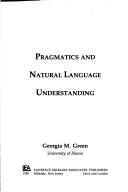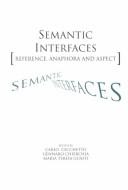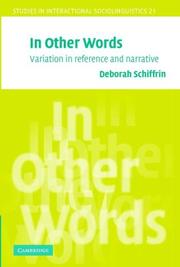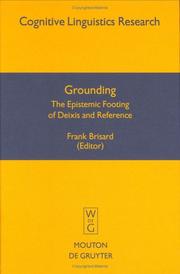| Listing 1 - 10 of 24 | << page >> |
Sort by
|
Book
ISBN: 9027250502 1556193319 9781556193316 9789027250506 9789027282699 9027282692 9786613222060 6613222062 128322206X Year: 1996 Volume: n.s., 38 Publisher: Amsterdam Benjamins
Abstract | Keywords | Export | Availability | Bookmark
 Loading...
Loading...Choose an application
- Reference Manager
- EndNote
- RefWorks (Direct export to RefWorks)
The papers in this volume are concerned with the question of how a speaker's intended referent is interpreted by the addressee. Topics include the interpretation of coreferential vs. disjoint reference, the role of intonation, syntactic form and animacy in reference understanding, and the way in which general principles of utterance interpretation constrain possible interpretations of referring expressions. The collection arises from a workshop on reference and referent accessibility which was held at the 4th International Pragmatics Conference in Kobe, Japan, July 25-30, 1993.
Linguistics --- Pragmatics --- Reference (Linguistics) --- Référence (Linguistique) --- Congresses --- Congrès --- Language arts --- Signification (Linguistics) --- Onomasiology --- Semantics --- Reference (linguistique)
Book
ISBN: 9781138062634 Year: 2017 Publisher: London : Routledge,
Abstract | Keywords | Export | Availability | Bookmark
 Loading...
Loading...Choose an application
- Reference Manager
- EndNote
- RefWorks (Direct export to RefWorks)
Language and languages --- Structural linguistics --- Reference (Linguistics) --- Semantics (Philosophy) --- Sémantique (philosophie) --- Référence (linguistique) --- Philosophie du langage. --- Philosophy --- Russell, Bertrand

ISBN: 0898598532 Year: 1989 Publisher: Hillsdale, N.J. Erlbaum
Abstract | Keywords | Export | Availability | Bookmark
 Loading...
Loading...Choose an application
- Reference Manager
- EndNote
- RefWorks (Direct export to RefWorks)
Lexicology. Semantics --- Pragmatics --- Cognitive science --- Discourse analysis --- Reference (Linguistics) --- Semantics (Philosophy) --- Sciences cognitives --- Analyse du discours --- Pragmatique --- Référence (Linguistique) --- Sémantique (Philosophie) --- Référence (Linguistique) --- Sémantique (Philosophie)
Book
ISBN: 9780198790358 019879035X 0191837024 Year: 2016 Publisher: Oxford Oxford University Press
Abstract | Keywords | Export | Availability | Bookmark
 Loading...
Loading...Choose an application
- Reference Manager
- EndNote
- RefWorks (Direct export to RefWorks)
Philosophy of language --- Language and languages --- Philosophy of mind. --- Reference (Linguistics) --- Reference (Philosophy) --- Thought and thinking. --- Pensée --- Référence (Philosophie) --- Référence (Linguistique) --- Langage et langues --- Philosophie de l'esprit --- Philosophy. --- Philosophie --- Pensée --- Référence (Philosophie) --- Référence (Linguistique)

ISBN: 0262650495 Year: 1998 Publisher: Cambridge, Mass. MIT
Abstract | Keywords | Export | Availability | Bookmark
 Loading...
Loading...Choose an application
- Reference Manager
- EndNote
- RefWorks (Direct export to RefWorks)
Philosophy of language --- Definiteness (Linguistics) --- Description (Philosophy) --- Language and languages --- -Reference (Linguistics) --- Signification (Linguistics) --- Linguistics --- Onomasiology --- Semantics --- Foreign languages --- Languages --- Anthropology --- Communication --- Ethnology --- Information theory --- Meaning (Psychology) --- Philology --- Philosophy --- Indefiniteness (Linguistics) --- Grammar, Comparative and general --- Determiners --- Reference (Linguistics) --- Philosophy. --- Definiteness (Linguistics). --- Description (Philosophy). --- Reference (Linguistics). --- LANGAGE ET LANGUES --- DESCRIPTION (PHILOSOPHIE) --- DEFINIS --- REFERENCE (LINGUISTIQUE) --- PHILOSOPHIE --- Philosophie du langage
Book
ISBN: 9780199659999 9780199659982 0199659990 0199659982 0191635464 1299195830 0191745405 Year: 2012 Publisher: Oxford Oxford University Press
Abstract | Keywords | Export | Availability | Bookmark
 Loading...
Loading...Choose an application
- Reference Manager
- EndNote
- RefWorks (Direct export to RefWorks)
Francois Recanati presents his theory of mental files, a new way of understanding reference in language and thought. He aims to recast the 'nondescriptivist' approach to reference that has dominated the philosophy of language and mind in the late twentieth century. According to Recanati, we refer through mental files, which play the role of so-called 'modes of presentation'. The reference of linguistic expressions is inherited from that of the files we associate with them. The reference of a file is determined relationally, not satisfactionally: so a file is not to be equated to the body of (mis)information it contains. Files are like singular terms in the language of thought, with a nondescriptivist semantics.In contrast to other philosophers, Recanati offers an indexical model according to which files are typed by their function, which is to store information derived through certain types of relation to objects in the environment. The type of the file corresponds to the type of contextual relation it exploits. Even detached files or 'encyclopedia entries' are based on epistemically rewarding relations to their referent, on Recanati's account. Among the topics discussed in this wide-ranging book are: acquaintance relations and singular thought; cognitive significance; the vehicle/content distinction; the nature of indexical concepts; co-reference de jure and judgments of identity; cognitive dynamics; recognitional and perceptual concepts; confused thought and the transparency requirement on modes of presentation; descriptive names and 'acquaintanceless' singular thought; the communication of indexical thoughts; two-dimensional defences of Descriptivism; the Generality Constraint; attitude ascriptions and the 'vicarious' use of mental files; first-person thinking; token-reflexivity in language and thought.
Philosophy of language --- Thought and thinking. --- Reference (Philosophy). --- Reference (Linguistics). --- Language and languages --- Philosophy of mind. --- Pensée --- Référence (Philosophie) --- Référence (Linguistique) --- Langage et langues --- Philosophie de l'esprit --- Philosophy. --- Philosophie --- Pensée --- Référence (Philosophie) --- Référence (Linguistique) --- Memory.
Book
ISBN: 9780262034555 0262034557 0262335328 9780262335324 9780262335317 026233531X 0262335336 Year: 2016 Publisher: Cambridge, Mass. The MIT Press
Abstract | Keywords | Export | Availability | Bookmark
 Loading...
Loading...Choose an application
- Reference Manager
- EndNote
- RefWorks (Direct export to RefWorks)
"To communicate, speakers need to make it clear what they are talking about. The act of referring, which anchors words to things, is a fundamental aspect of language. In this book, Kees van Deemter shows that computational models of reference offer attractive tools for capturing the complexity of referring. Indeed, the models van Deemter presents cover many issues beyond the basic idea of referring to an object, including reference to sets, approximate descriptions, descriptions produced under uncertainty concerning the hearer's knowledge, and descriptions that aim to inform or influence the hearer. The book, which can be read as a case study in cognitive science, draws on perspectives from across the cognitive sciences, including philosophy, experimental psychology, formal logic, and computer science. Van Deemter advocates a combination of computational modeling and careful experimentation as the preferred method for expanding these insights. He then shows this method in action, covering a range of algorithms and a variety of methods for testing them. He shows that the method allows us to model logically complicated referring expressions, and demonstrates how we can gain an understanding of reference in situations where the speaker's knowledge is difficult to assess or where the referent resists exact definition. Finally, he proposes a program of research that addresses the open questions that remain in this area, arguing that this program can significantly enhance our understanding of human communication"--MIT CogNet.
Lexicology. Semantics --- Psycholinguistics --- Mathematical logic --- Mathematical linguistics --- Reference (Linguistics) --- Presupposition (Logic) --- Computational linguistics. --- Référence (linguistique) --- Présupposition (logique) --- Linguistique --- Informatique --- Informatique. --- Signification (Linguistics) --- Linguistics --- Onomasiology --- Semantics --- Automatic language processing --- Language and languages --- Language data processing --- Natural language processing (Linguistics) --- Applied linguistics --- Cross-language information retrieval --- Multilingual computing --- Language and logic --- Logic --- Data processing --- LINGUISTICS & LANGUAGE/General --- COGNITIVE SCIENCES/General --- COMPUTER SCIENCE/General

ISBN: 1575863162 1575863154 Year: 2001 Publisher: Stanford, Calif. CSLI
Abstract | Keywords | Export | Availability | Bookmark
 Loading...
Loading...Choose an application
- Reference Manager
- EndNote
- RefWorks (Direct export to RefWorks)
Lexicology. Semantics --- Grammar --- Semantics. --- Reference (Linguistics) --- Grammar, Comparative and general --- Sémantique --- Référence (Linguistique) --- Aspect (Linguistique) --- Temps (Linguistique) --- Aspect. --- Tense. --- Reference (Linguistics). --- Sémantique --- Référence (Linguistique) --- Semantics --- Formal semantics --- Semasiology --- Semiology (Semantics) --- Comparative linguistics --- Information theory --- Language and languages --- Lexicology --- Meaning (Psychology) --- Signification (Linguistics) --- Linguistics --- Onomasiology --- Tense (Grammar) --- Aspect (Linguistics) --- Aspect --- Tense --- Temporal constructions --- Verbal aspect --- Verb --- Philology

ISBN: 9780521484749 9780521481595 052148474X 0521481597 9780511616273 0511146108 9780511146107 051114654X 9780511146541 0511147112 9780511147111 0511616279 1280414685 9781280414688 9786610414680 6610414688 1107141567 0511184069 0511322771 Year: 2006 Volume: 21 Publisher: Cambridge, UK ; New York : Cambridge University Press,
Abstract | Keywords | Export | Availability | Bookmark
 Loading...
Loading...Choose an application
- Reference Manager
- EndNote
- RefWorks (Direct export to RefWorks)
What we say always consists of prior words, structures and meanings that are combined in new ways and re-used in new contexts for new listeners. In this book, Deborah Schiffrin looks at two important tasks of language - presenting 'who' we are talking about (the referent) and 'what happened' to them (their actions and attributes) in a narrative - and explores how this presentation alters in relation to emergent forms and meanings. Drawing on examples from both face-to-face talk and public discourse, she analyses a variety of repairs, reformulations of referents, and retellings of narratives, ranging from word-level repairs within a single turn-at-talk, to life story narratives told years apart. Bringing together work from conversation analysis, interactional sociolinguistics, cognitive semantics, pragmatics, and variation analysis, In Other Words will be invaluable for scholars wishing to understand the many different factors that underlie the shaping and re-shaping of discourse over time, place and person.
Reference (Linguistics) --- Narration (Rhetoric) --- Sociolinguistics. --- Référence (Linguistique) --- Narration --- Sociolinguistique --- Narration (Rhetoric). --- Reference (Linguistics). --- Référence (Linguistique) --- Sociolinguistics --- Language and languages --- Language and society --- Society and language --- Sociology of language --- Language and culture --- Linguistics --- Sociology --- Integrational linguistics (Oxford school) --- Signification (Linguistics) --- Onomasiology --- Semantics --- Narrative (Rhetoric) --- Narrative writing --- Rhetoric --- Discourse analysis, Narrative --- Narratees (Rhetoric) --- Social aspects --- Sociological aspects --- Arts and Humanities --- Language & Linguistics

ISBN: 3110173697 3111856518 3110899809 9783110899801 9783110173697 Year: 2002 Volume: 21 Publisher: New York ; Berlin Walter de Gruyter
Abstract | Keywords | Export | Availability | Bookmark
 Loading...
Loading...Choose an application
- Reference Manager
- EndNote
- RefWorks (Direct export to RefWorks)
This compilation of invited contributions, gathering an international collection of cognitive and functional linguists, offers an outline of original empirical work carried out in grounding theory. Grounding is a central notion in cognitive grammar that addresses the linking of semantic content to contextual factors that constitute the subjective ground (or situation of speech). The volume illustrates a growing concern with the application of cognitive grammar to constructions establishing deixis and reference. It proposes a double focus on nominal and clausal grounding, as well as on ways of integrating analyses across these domains.
Cognitieve spraakkunst --- Cognitive grammar --- Cognitive linguistics --- Grammaire cognitive --- Grammar [Cognitive ] --- Linguistique cognitive --- Psycholinguistique cognitive --- Reference (Linguistics) --- Référence (Linguistique) --- Spraakkunst [Cognitieve ] --- Verwijzing (Taalwetenschap) --- Linguistics --- Philosophy of language --- Comparative linguistics --- Grammar --- Pragmatics --- Cognitive grammar. --- Grammar, Comparative and general --- Deixis. --- Signification (Linguistics) --- Deixis (Linguistics) --- Deictic function --- Onomasiology --- Semantics --- Indexicals (Semantics) --- Psycholinguistics --- Grammar [Comparative and general ] --- Deixis --- Philology
| Listing 1 - 10 of 24 | << page >> |
Sort by
|

 Search
Search Feedback
Feedback About UniCat
About UniCat  Help
Help News
News